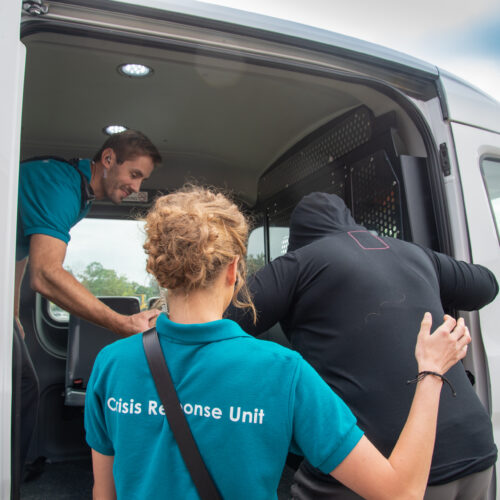
New Assessment Tool Helps Jurisdictions Build and Implement Successful Community Responder Programs
Jurisdictions across the country are reimagining their approach to public safety by investing in community responder programs that position health professionals and community members trained in crisis response as first responders.
To support these efforts, the CSG Justice Center recently released the Expanding First Response Assessment Tool—a web-based resource designed to help communities determine where they are in planning, implementing, and sustaining a community responder program in less than 15 minutes. The tool gives users the choice to take one of five assessments to either determine their readiness for the program, how well their implementation is going, and/or whether they have the tools to sustain their program.
Once selected, communities can assess their progress and learn about next steps to building a fully operational program unique to their community’s needs. Users receive a summary of their results and resources to aid their progress or amplify their success story upon completion. Tool guidance can range from information on best practices drawn from research to online resources and connections to existing community responder program managers and staff.
“The assessment tool provides valuable insight and practical information for areas exploring alternative responses. It will cover all your bases and guide you and your agency in involving everyone—from community members to stakeholders—in your development and implementation process,” said Carleigh Sailon, Denver STAR operations manager, who reviewed the tool ahead of its launch.
The Expanding First Response Assessment Tool is a complementary component of the groundbreaking toolkit, Expanding First Response, which was launched last year. The toolkit serves as a central hub for local communities and states looking to establish or strengthen community responder programs, as well as to learn from existing programs’ successes and challenges.
Topics covered by the assessment tool follow the organization of the toolkit, including:
- Community Engagement
- Needs Assessment
- Program Staffing
- Call Triaging
- Use of Data to Inform Decision Making
- Safety and Wellness
- Financial Sustainability
- Legislative and Policy Strategies
“Community responder programs have the potential to create a public safety system built around care instead of unnecessarily punitive responses,” said Ashtan Towles, senior project analyst in the Behavioral Health Division of the CSG Justice Center. “We have worked to build the Expanding First Response Assessment Tool to help practitioners across the country determine what they need to successfully develop and sustain such programs.”
The assessment tool is supported by a grant from the Alkermes Inspiration Grants® program, which is funded by Alkermes, Inc.
About the author

This May, the state of Washington passed legislation supporting the expansion of alternative response teams (sometimes called community…
Read MoreThe CSG Justice Center has partnered with the Pennsylvania Commission on Crime and Delinquency and CIT International to…
Read More Developing a Common Definition for Community Responder Programs
Developing a Common Definition for Community Responder Programs
This May, the state of Washington passed legislation supporting the expansion of…
Read More CSG Justice Center Launches Nation’s 1st Statewide Crisis Intervention Teams (CIT) Technical Assistance Center in Pennsylvania
CSG Justice Center Launches Nation’s 1st Statewide Crisis Intervention Teams (CIT) Technical Assistance Center in Pennsylvania
The CSG Justice Center has partnered with the Pennsylvania Commission on Crime…
Read More









